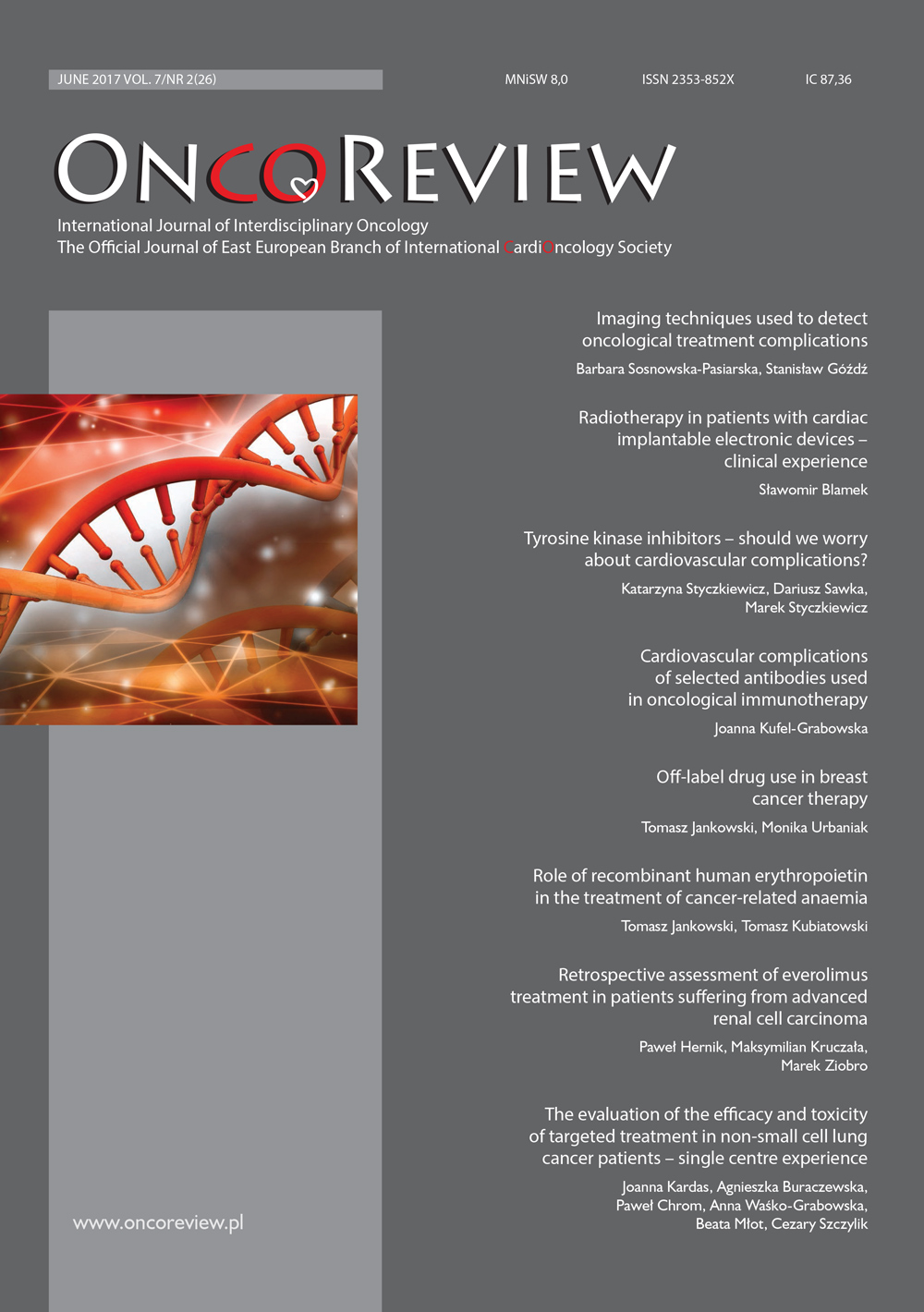Off-label drug use in breast cancer therapy Review article
Main Article Content
Abstract
Breast cancer is one of the most common malignancies across the world, including Poland. Chemotherapy plays an important part in the treatment of the disease. Most of the available chemotherapy drugs and regimens have undergone randomized clinical studies and have been registered for that specific indication. However, a number of drugs are used in an off-label manner, i.e. outside the officially approved product specifications. The paper discusses the use of several off-label therapies in breast cancer in order to demonstrate that such treatment may be well-grounded and indeed turns out beneficial in many cases. It describes the use of liposomal doxorubicin in pre- and post-operative treatment, capecitabine for incomplete efficacy of preoperative treatment, and the administration of metronomic vinorelbine. Moreover, the paper is aimed at demonstrating the legal basis and the principles of marketing authorization of off-label drug use.
Downloads
Metrics
Article Details

This work is licensed under a Creative Commons Attribution-NonCommercial 4.0 International License.
Copyright: © Medical Education sp. z o.o. This is an Open Access article distributed under the terms of the Attribution-NonCommercial 4.0 International (CC BY-NC 4.0). License (https://creativecommons.org/licenses/by-nc/4.0/), allowing third parties to copy and redistribute the material in any medium or format and to remix, transform, and build upon the material, provided the original work is properly cited and states its license.
Address reprint requests to: Medical Education, Marcin Kuźma (marcin.kuzma@mededu.pl)
References
2. Krzakowski M. Nowe możliwości w uzupełniającym leczeniu systemowym chorych na raka piersi. Onkologia w Praktyce Klinicznej 2007; 3(1): 8-15.
3. Lu YC, Ou-Yang F, Hsieh CM et al. Pegylated liposomal doxorubicin as adjuvant therapy for stage I-III operable breast cancer. In Vivo 2016; 32(2): 159-163.
4. Lien MY, Liu LC, Wang HC et al. Safety and efficacy of pegylated liposomal doxorubicin-based adjuvant chemotherapy in patients with stage I-III triple-negative breast cancer. Anticancer Res 2014; 34(12): 7319-7326.
5. Hamel S, McNair DS, Birkett NJ. Off-label use of cancer therapies in women diagnosed with breast cancer in the United States. Springerplus 2015; 4: 209.
6. Lee SJ, Toi M, Lee ES et al. A phase III trial of adjuvant capecitabine in breast cancer patients with HER2-negative pathologic residual invasive disease after neoadjuvant chemotherapy (CREATE-X, JBCRG-04). 2015 San Antonio Breast Cancer Symposium. Abstract S1-07. Presented December 9, 2015.
7. von Minckwitz G, Reimer T, Potenberg J et al. The phase III ICE study: Adjuvant ibandronate with or without capecitabine in elderly patients with moderate or high risk early breast cancer. 2014 San Antonio Breast Cancer Symposium. Abstract S3-04. Presented December 11, 2014.
8. Bujak A, Kałas W. Chemioterapia metronomiczna jako nowa strategia leczenia chorób nowotworowych. Postępy Hig Med Dośw 2008; 62: 364-371.
9. Su WH, Ho TY, Li YT et al. Metronomic therapy for gynecologic cancers. Taiwan J Obstet Gynecol 2012; 51: 167-178.
10. Munoz R, Shaked Y, Bertolini F et al. Anti-angiogenic treatment of breast cancer using metronomic low-dose chemotherapy. Breast 2005; 14: 466-479.
11. Cazzaniga ME on behalf of the VICTOR-2 Study. Poster presentation at 10th European Breast Cancer Conference (abstract 375). Amsterdam, The Netherlands. 09-11 March 2016.
12. De Iuliis F, Salerno G, Taglieri L et al. On and off metronomic oral vinorelbine in elderly women with advanced breast cancer. Tumori 2015; 101(1): 30-35.
13. Cazzaniga ME, Torri V, Villa F et al. Efficacy and safety of the all-oral schedule of metronomic vinorelbine and capecitabine in locally advanced or metastatic breast cancer patients: the Phase I-II VICTOR-1 study. Int J Breast Cancer 2014; 769790. https://doi.org/10.1155/2014/769790.
14. Ustawa z dnia 12 maja 2011 r. o refundacji leków, środków spożywczych specjalnego przeznaczenia żywieniowego oraz wyrobów medycznych. Official Journal of Laws 2016, item 1536.
15. Luty O. Zaniechanie zlecenia produktu leczniczego poza zarejestrowanymi wskazaniami a odpowiedzialność cywilnoprawna lekarza. Cz. II. Obowiązek zlecenia leku off label i konsekwencje jego niewykonania. Prawo i Medycyna 2014; 2: 132-150.
16. Szafrański T, Szafrańska A. Przechadzki po polu minowym – uwagi dotyczące stosowania leków niezgodnie z charakterystyką produktu leczniczego. Postępy w Psychiatrii i Neurologii 2012; 2: 108.
17. Gałęska-Śliwka A. Pozarejestrowe stosowanie leków (off label use). Serwis Prawniczy Prawo i Zdrowie [Access: 31 May 2017].
18. Polaczuk P. Przeciwdziałanie off label use w prawie europejskim. Zarys wybranych problemów. Studia Prawno – Ekonomiczne 2016; t. C: 155.
19. Zajdel J. Stosowanie produktów leczniczych „off label use” w populacji pediatrycznej – działanie na granicy ryzyka, czy dołożenie należytej staranności? Przegląd Lekarski 2011; 68(1): 35.
20. Decision of the Supreme Court of 10 February 2010, case file reference number V CSK 287/09.
21. Urbaniak M, Cofta S. Zasady postępowania lekarza wobec pacjenta – komentarz do art. 6 i art. 7 KEL. Medyczna Wokanda 2015; 7: 54.

